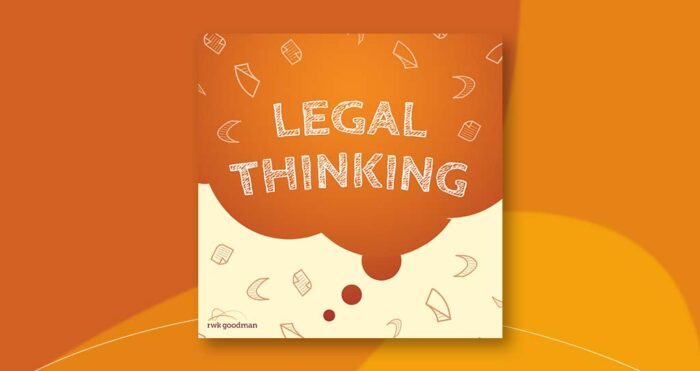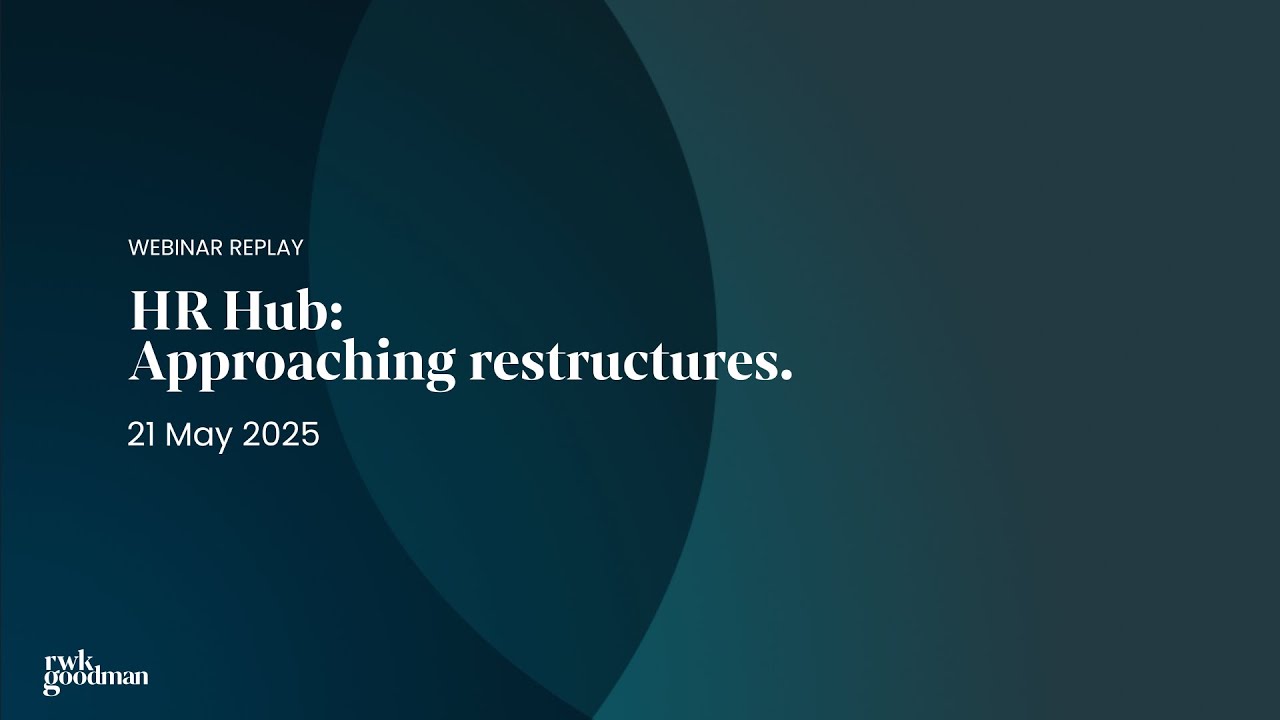Confidentiality and competition in employment | Legal Thinking Podcast
This podcast transcript has been edited in places for readability. You can also listen to our podcast on your podcast platform of choice - find it here >
Hello and welcome to Legal Thinking. In today's episode, we speak about protection of confidential information, and we talk about that with Caroline Doran Millett and Juliette Sanderson Neil, both of whom are solicitors in RWK Goodman’s Employment team.
We speak about the differences between fiduciary and implied duties, practical steps to protect confidential information and the difference between exactly what confidential information and trade secrets are. So without any further ado, let's roll tape.
Can you start off by explaining the difference between fiduciary duties and implied duties of confidentiality during employment?
Caroline Doran Millet: Yes, this is an interesting one. So every single employee has implied duties in their contracts, even if they haven't signed a contract. So there are implied duties for every single employee in the UK, regardless of how senior or otherwise they are and that includes implied duties of trust and confidence. Which is a mutual duty and also a duty of confidentiality which is a duty to respect the confidentiality of the employer's commercial and business information.
Now, what's particularly interesting in that is that it only applies during the employment relationship. So sometimes we have employers who for one reason or the other haven't asked a member of staff to sign a contract or more likely, they cannot find the contract. So there is a benefit that there is this ‘implied duties’ concept that exists. So the implied duty is only going to protect certain types of confidential information, that information which is obviously confidential or it has been protected as confidential. It's been marked private and confidential, not to be circulated during the employment contract. So there are some benefits and protections for employers in relation to some confidentiality for all employees during the employment relationship.
There's also a different concept which is fiduciary duties. Now a fiduciary is a, it's a very high standard of a duty, which only applies to somebody who is very senior. So some very senior employees would be considered to be fiduciaries or more commonly, Company directors would be considered to be fiduciaries. An employee who owes a fiduciary duty is expected to act in the best interest of the company. They have undivided loyalty to the company, or they are expected to meet that threshold and at the heart of that is that they are, they must not pursue their own self-interest, and they must not benefit from the company's property, including the company's information. So if somebody is a fiduciary, like a company director, or we would argue, if we were acting on behalf of a company that very senior employees who have financial information or in a sort of a very high position within the company, that they are also so senior, they are equivalent fiduciaries and that they must act with these obligations and these high thresholds of duties. It's a high bar to pass, but it can be a very useful argument, because the courts will have high expectations as to how those individuals treat confidential information and use it during and also after their employment.
And how can employees ensure that their employees understand the importance of confidentiality during their employment? Juliette, would you like to pick this one up?
Juliette: So employers should really be thinking about taking practical steps to put employees on notice that certain information is considered confidential and commercially sensitive.
Steps that could be taken are, for instance, circulating certain key information to only limited numbers of employees marking sensitive information as being confidential using different coloured paper for documents with different degrees of confidentiality circulating information in files, envelopes or emails marked specifically confidential. That's quite common these days, seeing as everything's done by email and if it's practical if you're thinking about operating security measures for some databases, that could be useful or if the information is stored manually, then you could put it in a cupboard and a filing cabinet. But password protection is always key when you're using databases.
Employers should be regularly monitoring the use of emails, photocopiers and similar devices. From a GDPR perspective, it may also be necessary to implement a proper monitoring procedure so to ensure that employees rights in relation to their personal data are respected.
Also, employers should ensure that there is a proper reporting procedure. It seems obvious. But employers should know exactly what their staff are doing and how they're handling confidential and sensitive information and finally, there could be a use of confidential confidentiality agreements. These are commonly referred to as NDAs, but solicitors should probably be involved in this process to ensure that they're correctly drafted and not misused in any way.
And I think you've touched upon some of them there. But what are some of the practical steps that an employer can take to protect confidential information in advance?
Caroline: Juliette has numbered really useful practical points that employers need to think about. Usually as a business owner, we can be so busy with the day-to-day business of keeping clients happy and providing the goods and services that we don't think about what could happen if things go wrong or if there's an issue with an employee who wants to leave and set up in competition.
From my perspective there are some particular times in the employment cycle which are dangerous such as if there are sort of redundancy or restructuring discussions or once somebody has put in their notice of resignation. These are usually periods when we need to be particularly careful with members of staff in terms of what they're accessing and to monitor this.
I'm also a firm believer in prevention rather than cure. So quite often a polite reminder to staff, perhaps once they have resigned or during any consultation periods that they, they remain an employee. That we expect them to comply with all of their duties in terms of, in relation to confidential information and if they've got any questions to speak to, a line manager or a member of staff.
I do see usually it is when somebody has resigned. Usually they have made preparations in advance. The usually the mining of somebody's confidential information has happened weeks or perhaps months in advance of that resignation. So sometimes it's a matter of going back to double check what has been accessed downloaded, printed and even though it's very rare, it still does happen that people still send information to their personal accounts or set up email accounts which look very similar to a client's account email address, but maybe has a couple of letters, which is different. So it's more difficult for IT to spot that information is being sent backwards and forwards which isn't the proper domain.
We also are seeing that particularly with hybrid working, it's so much easier for employees at home to access the information and perhaps not appreciate that their their access of the company systems is being monitored in the normal way, even though they're not working from the usual office.
So there's these things that need to be considered in terms of what we're going to do, because the working environment has changed for a lot of us over the last couple of years even though the danger scenarios and the pressure points in terms of resignations, redundancies, somebody issuing a grievance or a disciplinary, they might be scenarios when somebody is more likely to be concerned about their future or perhaps disgruntled.
And what's the difference between confidential information and trade secrets?
Caroline: Usually a company, or an employer, will think that these are one and the same. However, the courts have a very different interpretation.
So a trade secret is the gold standard for an employer. You get the best protection for your information, if you can show it really is a trade secret. It's something top, top secret, confidential. You've protected it. You know, it's it's a high bar at something like the secret recipe for Coca Cola. It's things like a secret process of manufacturing something a chemical formula, secret designs or special methods of construction or other information which is protected by with a sufficiently high degree of confidentiality to amount to a trade secret. So this is a high bar for employers to reach.
Confidential information has been described by the courts as merely confidential information, mere confidential information. This is something which is commercially sensitive, and it might be sales or client information, which there is a risk to a company that the individuals leaving employment still could use that information, even though it's mere confidential information. If there's not any contract of employment protecting that or if the person is a fiduciary the types of things which can be mere confidential information and protected, depending on where it falls in the employment cycle and whether or not there's contracts, etc. Would include things like source codes, customer lists and client information, financial information and business plans, research and development, those kind of things.
So these types of mere confidential information may only be used by the employee during employment for the benefit of the employer and then if it is inevitably carried away in the employee's head after the employment has been, has ended, then it can be used by the individual. If it is something which I, I leave an employment and I carry away that the name of our main client or customer that potentially could be used. The courts have said that deliberately memorizing this kind of information is the same as photocopying it. So we've seen people deliberately trying to memorize information and pass it off as something which they just happen to have in their head. But you couldn't take a client list with you and say, well, actually, I've stolen a hundred clients in this list. I've taken this away, but I would have remembered ten of them in any event. The courts will not like that approach and say, well you can't you've stolen this document from your employer. You can't use any of the information, even if it happens to be in your head, because we don't actually know what is in your head and what you have taken unlawfully from your employer.
How can an employer enforce restrictive covenants to protect their confidential information?
Caroline: So there are different types of post-termination restrictive covenants.
An employer can utilize non-compete restrictive covenants, which essentially means that the employee is for a specific amount of time prohibited from working for competitors. These can be useful, but they must be designed to protect the employer's confidential information, trade secrets or customer connections. So essentially preventing the employee from obtaining an unfair advantage by exploiting these for their own or another employer's benefit, restrictive covenants having the sole aim of preventing competition are never upheld by the court however.
So I would say that non-solicitation clauses such as non-solicitation of clients or key employees are therefore looked on more favourably than pure non-competition clauses, and they can be enforced in the High Court if there's a breach of the restrictive covenant.
What are the potential consequences for an employee who breaches their duties of confidentiality during or after their employment?
Caroline: An employer has more options if they discover the breach while the person is still employed. So it's much better for an employer if they take proactive steps to ensure that they monitor, access and use while people are employed. Because this they have a greater number of options and remedies available to them.
So if it happens during employment, an employer can discipline and dismiss for gross misconduct if there's evidence that somebody has unlawfully downloaded client or customer information, for example for a use other than during their employment, there might also be financial penalties that could be imposed such as if it was gross misconduct. The individual might not get their notice. They may not get their bonuses or potentially you could even claw back certain bonuses and awards and options depending on what is in their contract and there might be other bad leaver clauses. Also, if they are dismissed for gross misconduct, that's something that that could be included in their reference and also if the person is regulated that's something you could potentially notify the regulator that the person has done something dishonest. Those are all very useful tools in our armoury.
If it is discovered after they have left employment the options are as follows and we if somebody is an employee, we can also use these as sanctions and remedies as well as the employment consequences. So the – sort of - entry level, if you do discover a potential breach, would be to obtain a contractual undertaking from the employee. This is a promise that they're going to comply with their contractual obligations. Also, potentially as an employer, you could seek undertakings, contractual undertakings from the new employer that the individual is going to move to. That can be quite useful to notify what kind of person that they are dealing with somebody who might be as interested in stealing their confidential information in future.
So these are the most basic form of protection after a suspected breach. They are a line in the sand, and it's a sign if the individual is refusing to sign a mere contractual obligation, that they intend to comply with their contractual obligations to you, that the person has bad faith or is going to be a bad operator, so that, that can be quite useful and the courts can look more favourably on an employer who is at least trying to get this resolved amicably and asked for the contractual obligations.
The next level of protection, if you have started legal proceedings for a court order restricting the use of your own confidential information by a third party, is to ask for an undertaking to the court. Now, these are much more interesting because a breach of these kind of promises is contempt of court and potentially it could be punishable by imprisonment. So usually individuals take these types of undertakings or promises to the court much more seriously and these can be a very useful tool to scare the other side into complying with their obligations and if you're happy with the levels of undertakings, it might mean that you don't have to go and take further steps and don't have to spend further time or effort in proceeding with court proceedings.
The other steps that you can do is you can look for damages so the employer can look for contractual damages for the losses. So you would the starting point would be that the ex employer would have to demonstrate to the court it has suffered financial loss, and that this loss is a result of those specific breaches. The issue that we sometimes find with damages is that the employee said, well, these clients would have left anyway. Even if I had not stolen this confidential information, I know that this particular client was unhappy with the company and was thinking about moving in any event and we would have to show that the specific breach, the the stealing the confidential information is a reason for that loss. So damages is a useful way of getting a financial payment, compensation for the breaches. But there are challenges with that.
Other sanctions that you can look at is to obtain an injunction. So you would go to court and look for an injunction against the employee to either enforce particular restrictive covenants, like the restrictive covenants Juliette has talked about or to prevent the specific use of confidential information. You would say, I know they have downloaded and accessed our client information. I want an injunction to make sure that they are not going to use that in their new business, which they've set up or for their new employer. An injunction is only ever going to be granted if the court is satisfied that financial damages just aren't going to be enough. If the court understands that by the time the individuals have contacted everybody else on that client list, which has been unlawfully downloaded, the employer is not going to have a business left. It's just too much damage will have been done. So an interim injunction might be granted in those kind of situations. It's a holding measure, something a temporary fix until we can get to trial to try to resolve the matter. Now, the issue is that even the speediest, court proceedings can take weeks, sometimes even months, to get to trial. So that's why it's very important to look at these sort of other kind of tools.
As well as an ordinary interim injunction, sometimes it's appropriate to go for what we call a springboard injunction. This can be granted if the employees have actually used the employer's confidential information for their own advantage, such as they've already downloaded and contacted dozens of clients, and they've gained a head start in competition with their former employer, they've done an unlawful act, and they've, they spring forward ahead and they're getting a benefit that they shouldn't be doing and the courts don't like that. Now, this is an equitable remedy. So the courts will be looking at whether you have clean hands as well as the employer in relation to this. Also another equitable remedy is an account of profits. This is an alternative to contractual damages and the benefit of this is that it focuses on the ex-employees profits, all the money that they are getting rather than an ex employer's losses. So, for example, the ex-employees gains might be much greater than the company's losses. Now that that can only be used if there's a breach of fiduciary duties, the fiduciary duty generally, or the duty of confidence, it's not just a breach of your employment contract. It's not just a breach of your restrictive covenants or your confidentiality clause. It's a much higher threshold to get those. But when you can get an account of profit, if somebody is very senior or a company director, it can be very interesting and again, when one goes to equity, you have to come with clean hands. So the employer, if you were going to go after an account of profits, you would have to make sure that you used sort of honourable ways of pursuing the litigation and that you complied with all court directions. So it's to make sure that if you're going for an equitable relief, a very powerful tool like this that you are coming to the courts and you have also done the right thing and have clean hands.
Can you explain the concept of repudiatory breach by an employer and how it relates to confidentiality in employment contracts?
Juliette: Sure. So a repudiatory breach by an employer can take the form of either reducing an employee's pay or not paying them at all, and demoting an employee without fair warning or reason, and making unreasonable changes to an employee's working hours or even a change in the place of work.
In a constructive, unfair dismissal situation, the employee essentially resigns in response to the employer's repudiatory breach of their employment contract and the employee is entitled to treat themselves as dismissed as a consequence and then essentially all of the contractual obligations under the employee's employment contract essentially fall away. Then the effect of this is that an employer cannot force any of the post-termination restrictions contained in the employee's contract of employment against the former employee and any other terms, that are intended to survive termination, essentially can't survive termination.
So it's really important that employers tread carefully and don't unwittingly commit a repudiatory breach of an employee's employment contract, because essentially it means that they're going to have a real difficulty in protecting their confidential information post termination of that employee's employment.
And finally, are there any business implications for an employer who fails to protect their confidential information?
Caroline: The issue that we can sometimes see with companies that come to us is that they haven't taken steps to put in contracts of employment or they haven't put in any other protection, protective measures, which Juliette has mentioned to highlight what is confidential, what information do they want to protect from the outside world and protect from their competitors and those kind of situations?
It can be very difficult to protect the use of confidential information by individuals after they leave employment. So while employees can be your greatest assets, sometimes they can be your biggest risk. We often ask employers to imagine if your best sales people or technical staff or innovators left to set up to set up a new business and competition or to go to your biggest competitor for imagine what damage they could do. If you haven't taken steps in advance to ensure that your confidential information and trade secrets are protected when they leave. The business needs to consider in advance what they actually consider is confidential and informal. Confidential information and trade secrets, what information they want to protect and ensure that other people cannot obtain the benefit of. Because quite often this confidential information, if it's a formula or a process or client lists, these are things which have taken, you know, years or even decades to perfect and you don't want to just give that to an employee and allow them to take that to a new employer and obtain the benefit of them.
So from our perspective there can be a huge amount of damage done by departing employees who take confidential information. If employers haven't set up the right systems to make sure that employees know that this is confidential, that it's not meant to be supplied with the outside world or to new employers and also set up the contractual regime. Just make sure that it's clear in the contract that they have the contract signed and kept, so that there is a clear regime for dealing with these matters. If the employee decides to leave in the future, then it's very clear there's a line in the sand as to who owns what and as an employer, you can say, “this is my information. The confidential information is as much our property as our laptops or mobile phones or other devices. This is our confidential information and you have to return it and you cannot use it after you leave”.
That's a good point well made. Caroline and Juliette, thank you very much for your time.

Subscribe to Legal Thinking
Want to hear more from our podcast?
Find out where you can subscribe and check our our back catalogue right here on our website.








